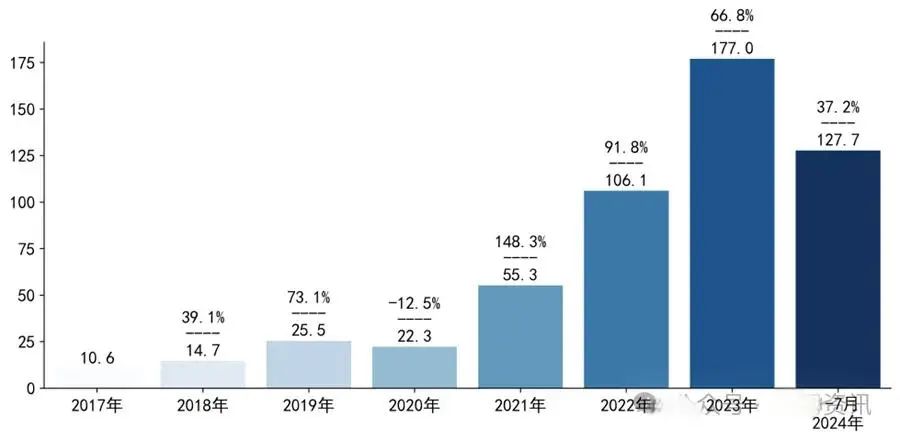U.S. strikes, EU opposes! The key battle for electric vehicles may be lost
![]() 09/30 2024
09/30 2024
![]() 456
456
There are increasingly pessimistic voices online, and a thick fog hangs over China's automotive industry.
The layoffs in auto companies are intensifying, turning many people into "flexible workers," and even ride-hailing drivers are not qualified anymore. On the other hand, demand continues to shrink, and only e-commerce platforms like Pinduoduo, which engage in unlimited consumption downgrading and have turned themselves into Somalia-like entities, have found a backdoor.
For auto companies, there is also a pessimistic outlook stemming from the compression of external market space. After the EU imposed temporary tariffs on Chinese electric vehicles, some people directly made a prediction:
China's automotive industry should prepare for the crucial battle against the EU and the potential loss in anti-subsidy investigation negotiations regarding electric vehicles.
This prediction is based on the recent consultative voting results among EU countries: out of 27 EU countries, only 4 opposed, 10 supported, 11 abstained, and 2 did not vote.
Despite the high-level visits by Chinese government officials to Europe in recent months, traversing multiple cities and communicating with several major and seemingly wavering countries,
Just as this was happening, the United States, the beacon nation on the other side of the Atlantic, added fuel to the fire by issuing a ban on smart connected vehicles equipped with Chinese and Russian hardware and software from operating on U.S. roads.
The U.S. move is quite ruthless for two reasons: First, Russia does not have smart connected vehicles, and by dragging Russia into the picture, the U.S. aims to create a terrifying atmosphere in Europe, where Russophobia has reached its peak.
Second, almost no Chinese cars are sold in the U.S., so how could they pose a security threat? Conversely, millions of U.S. smart connected vehicles, such as Teslas, are running on Chinese roads.

Senior officials from China's Ministry of Commerce have just met with high-level officials from Germany, Italy, and the EU. Germany and Italy are wavering in their stance, aiming to cooperate with Chinese automakers and promote the local establishment of factories.
The U.S. intervention at this juncture is driven by two main reasons: first, to prevent EU dove countries from cooperating with Chinese automakers; second, to block the further expansion of China's electric vehicle supply chain and jointly contain Chinese automakers with Europe.
The EU will vote next month on whether to impose permanent tariffs on Chinese electric vehicles. If approved, these tariffs would be imposed for at least five years. At that time, if China's new energy vehicles want to enter Europe, there are only two options:
First, accept the EU's high import tariffs and completely lose price competitiveness; second, build factories locally in Europe to avoid taxes.
Yuval Noah Harari, author of "Sapiens: A Brief History of Humankind," said, "The iron law of history is that events that seem inevitable in retrospect were far from obvious at the time."
01
History often repeats itself in surprising ways. Thirteen years ago, the photovoltaic industry faced a similar situation to the current new energy vehicle industry.
In 2011, after the U.S. initiated an anti-dumping and anti-subsidy investigation against Chinese photovoltaic products, the EU followed suit in 2012.
At that time, China exported 80% of its photovoltaic products to the EU and 20% to the U.S., so we were more concerned about the EU. Chinese automakers, like the photovoltaic companies of the past, have placed their bets on the EU, not because the U.S. market is unattractive but because they dare not enter it.
Based on the close relationship between China and the EU at the time and effective communication between high-level officials, the photovoltaic anti-dumping and anti-subsidy case ended with a satisfactory result: the EU did not impose tariffs, and China committed to exporting photovoltaic products to Europe at a minimum price for a specific period.
However, the current environment is vastly different from that time. Apart from U.S. competition, the rise of right-wing forces within the EU has even labeled the outcome of the photovoltaic case as a "shame" for the EU.

The situation for Chinese electric vehicles entering international markets is much more severe than that of photovoltaic products. The U.S.'s intention is clear: impose a 100% tariff right from the start, essentially barring imports.
This aggressive hostility has also objectively cut off the idea of Chinese automakers entering the U.S. to establish factories and produce locally. Chinese automakers have always believed that the business environment in the U.S. is too risky, and no one dares to enter.
The EU has been more rational, conducting several months of investigations and imposing a temporary tariff for three months as a test. Many countries' attitudes have fluctuated, and interests are fragmented. For example, after visiting China, Spain said it would reconsider its position.
Germany has consistently stated its opposition but abstained from the consultative vote. Italy, while voting in favor, later said that imposing tariffs was unfair and welcomed Chinese automakers to invest and build factories.
Obviously, these wavering countries do not want to offend China but also want to force Chinese automakers to build factories locally to benefit from this wave of automotive industry transfer.
Due to their strong industrial clustering capabilities, the establishment of an automaker can bring tens of thousands of jobs and attract a large number of component suppliers, leading to significant GDP growth. Many smart EU countries have similar aspirations to local governments in China seeking to attract automakers.
In Europe, a medium-sized automotive production plant can fully support an entire city, while a large plant with an annual capacity of several hundred thousand vehicles can even drive the economy of a small country, yielding considerable benefits.
For countries like Spain, Italy, and Hungary, where the automotive industry has declined, China's electric vehicle industry has the potential to revitalize their position in the European automotive industry and challenge existing powerhouses.
Another mindset is firmly opposed to tariff increases but has some reservations, such as Germany: First, German automakers produce electric vehicles in China and export them to Europe by controlling costs. Second, German automakers have significant interests in China and cannot afford to overstimulate the situation or engage in a trade war.
Germany's mindset is actually quite complex. Chinese electric vehicles compete with German vehicles, and their full entry into the EU may impact the German automotive market in the EU.
Therefore, Germany's actions are contradictory: neither supporting nor opposing.
Among major countries, only France is firmly in favor of imposing tariffs for a simple reason: French cars have been defeated in China, with negligible sales, leading to complaints and even fear.
In recent years, French automakers' executives have left China and never returned. Many sleepless nights were spent pondering the same question: if they can hold onto the European market, perhaps Renault, Peugeot, and Citroen would have a few more years to transform.
In Eastern European countries along the Baltic Sea, although there is no automotive industry, and tariff increases are unrelated to industrial competition, they oppose anything related to China and firmly support tariff increases for unstated reasons.
02
Although the situation looks bleak, it is not yet desperate.
Just two days before senior officials from China's Ministry of Commerce visited the EU headquarters in Brussels, Belgium, for talks with EU high-level officials, thousands of auto workers gathered at Brussels North Station on September 16 to protest by setting off fireworks.
They were from Audi's factory in Belgium, where the only produced model, the Audi Q8 E-Tron, had low sales, prompting Volkswagen Group to plan to close the factory.
European workers, accustomed to high welfare and a good life, cannot tolerate unpaid wages. In Brussels, a city of 1.2 million people, 5,000 people taking to the streets is already big news, terrifying officials.
As the mayor of Brussels struggled with the situation, news suddenly emerged that a Chinese new energy vehicle company would acquire Audi's factory, offering the best possible solution to locally resolve worker protests.
However, Belgium has already voted in favor of imposing tariffs on Chinese electric vehicles, signaling its stance. This hostility towards Chinese electric vehicles may hinder Chinese automakers' acquisition of the Audi factory.
Senior officials from relevant Chinese departments recently hinted to automakers that countries that propose tariffs on Chinese vehicles are often the same ones inviting Chinese automakers to invest. Automakers should remain highly vigilant towards these countries.
No wonder rumors about a Chinese new energy vehicle company inspecting the Audi factory in Brussels spread widely, but when the news reached China, the founder immediately denied it.
Xiao Li understands the severity of the situation. If automakers ultimately choose to invest in countries that suppress Chinese electric vehicles, it may go beyond corporate investment issues.
Belgium has a population of only 11.82 million, equivalent to the permanent resident population of Suzhou. Its automotive and trade markets are not large, and in Eastday's view, it is not worth spending more time negotiating and is usually left aside.
In the long run, it is only a matter of time before Chinese automakers establish factories in Europe, regardless of whether the EU ultimately imposes permanent tariffs on Chinese electric vehicles.
This is a consensus. Local production of automobiles is considered normal in China. Generally, automakers tend to establish local factories when their sales in a region reach a significant level.

However, the problem is that China's electric vehicle exports are not yet substantial enough to support local factory establishment, and the EU has already set high barriers. This is the most alarming aspect. Is the EU's intention really as simple as attracting investment?
There is a possibility that the EU is not forcing Chinese automakers to establish factories but rather protecting its traditional automotive industry. Some countries may even see a rise in anti-electric vehicle sentiment, reversing the trend towards electrification.
Looking at this year's data, electric vehicle sales in the EU have plummeted, with pure electric vehicle sales in August falling by 43.9%, marking the fourth consecutive month of decline. The main reason is the collapse in sales in Germany and France, the EU's two largest electric vehicle markets, with declines of 68.8% and 33.1%, respectively.
Germany abolished subsidies for electric vehicles last year, France revised its subsidy policy, and Italy followed suit. The EU's 2035 ban on combustion engines has also seen significant changes. The U.S. has adopted a complete defensive policy against Chinese electric vehicles, essentially closing its doors to the market, which Chinese automakers have completely abandoned.
The real challenge lies in whether Europe and the U.S., under the deep influence of the U.S., will form a tacit understanding against Chinese electric vehicles. At that point, we may be unable to reach the other two of the world's top three automotive markets.








